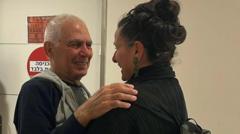The resurgence of antisemitism and anti-immigrant sentiments, fueled by the Gaza war, is challenging European unity, evident in recent protests and tensions surrounding cultural events like the Eurovision Song Contest.**
Gaza War Intensifies Europe's Divisions Amid Rising Antisemitism**

Gaza War Intensifies Europe's Divisions Amid Rising Antisemitism**
Ongoing conflicts in Gaza have strained social cohesion across Europe, affecting events from sports to cultural contests.**
The fallout from the ongoing Gaza war is significantly impacting Europe, straining efforts to maintain social cohesion and mutual respect within its diverse communities. The continent's institutions, originally designed to foster peace and unity following the post-World War II era, are now grappling with increasing antisemitism, the influx of refugees, and a rise in extremist anti-immigrant political rhetoric.
Recent events have highlighted the intensifying divisions among communities, particularly among young populations who identify strongly with the plight of those affected by the conflict in Gaza. Outrage against Israeli airstrikes, which have resulted in higher casualties, predominantly women and children, has galvanized protests and led to violent confrontations in various European cities.
One such incident occurred during a soccer match in Amsterdam, where assaults on Israeli fans prompted law enforcement to launch investigations into potential antisemitic attacks and aggressive behavior from both sides. This atmosphere of unease isn’t confined to sports; it has also seeped into cultural spheres.
The Eurovision Song Contest, traditionally a celebration of unity and artistic expression, was marred by pro-Palestinian demonstrations targeting Israeli participant Eden Golan during this year’s event in Malmo, Sweden. Despite aiming to keep the focus on entertainment, the organizers found themselves amidst political controversies as Golan's original lyrics reflecting on the Israeli casualties from a recent Hamas attack were deemed overly contentious and subsequently modified. Although she fared reasonably well among online voters, the audience's booing and jeering underline the growing discord undermining the event's intended spirit.
These incidents exemplify the broader challenges Europe faces in fostering a sense of communal belonging and collaboration, a task made even more daunting by the shadows cast by conflict in the Middle East. As the war in Gaza continues to press upon societal fractures in Europe, the prospects for a cohesive response seem increasingly remote.























